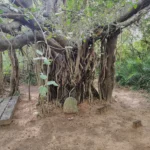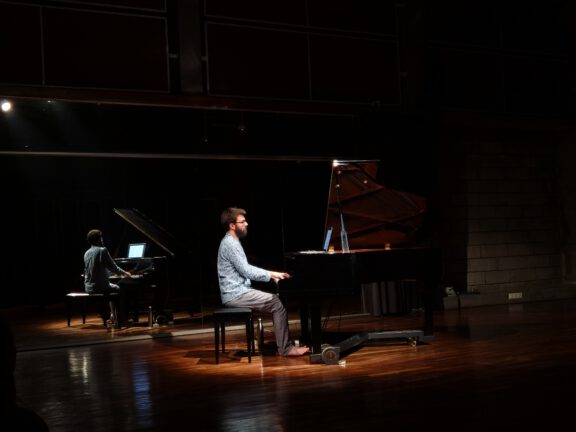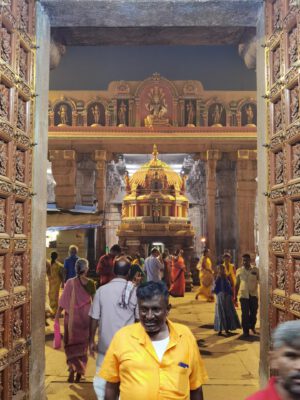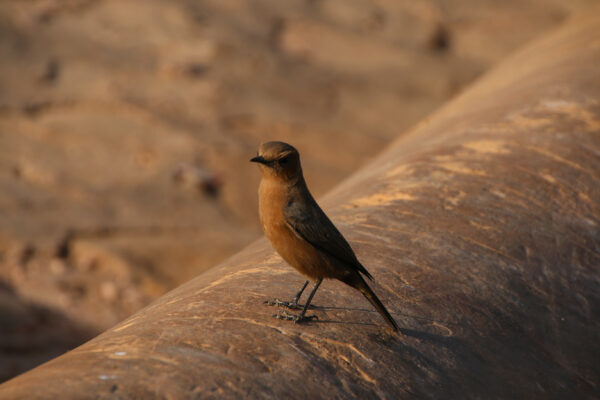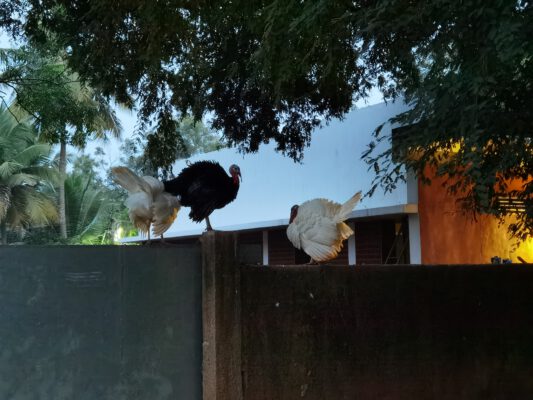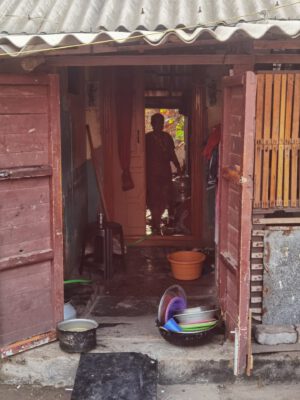Gilles Grimaître visits Auroville for a few days during his Pro Helvetia artist residency in Bengaluru, Chennai and Pondicherry to engage with Carnatic music. The program he chose for the evening from Dec. 17th, 2022, was a passionate, loving introduction to usually not so accessible Western avant-garde music.
Grimaître started off with Johannes Brahms – Drei Intermezzi op 117, some romantic crowd pleaser, followed by a more challenging piece by Olli Mustonen (*1967) called ‘Jehkin Iivana’. Nobody would know the composers he selected after Brahms for the evening unless you are a very dedicated avant-garde music enthusiast, he said. But he wanted to show, that avant-garde music can be fun and playful. We all smiled and laughed, when he played Daniel Moreira (*1984) – Rhythmic Study no 4 (“Ludvan ven Beethowig”). Moreira plays with Beethoven’s ‘Für Elise’, which almost everyone who likes piano music knows. He cuts and samples, loops and collages pieces in such a light and playful way, that we lose all fear of contemporary music.
I recognized Moreira’s teacher, Marco Stroppa, as a friend of mine also was a student of him. His students are funny, serious, eloquent. Gilles Grimaître played with astonishing lightness, joy and precision.
The next piece was by Beat Furrer (*1954) – ‘Voicelessness. The snow has no voice’. Grimaître laughed when he said that he chose that piece as a Christmas tune for Auroville. Snow around Christmas may be a rare event here and should trouble us deeply if it ever happens. The piece is sincere, concentrated, I saw the snowflakes dancing, losing any sense of time, there was no beginning nor end, no dramatic structure or storytelling, just meditative, minimalistic concentration.
After the piece, it took Grimaître an eternity of stage seconds to come back into the room. The intensity of concentration was palpable. The last piece was special, it was written by a composer from Ukraine, and we might guess why that fits into the year 2022. It was written many years ago by Valentin Silvestrov (*1937) called ‘Davos Lake’, for the Davos festival. There was a concept to play piano concerts one on one. The piano player would play for 5 minutes for one person in a small room. I thought that this is pure capitalism. But when I heard the music – so tender and heartfelt, intimate, and loving – I saw it as a guerilla tactic, to melt the hearts of the listener and create an intimate connection between performer and audience. This concept came up during Corona again, i.e. at the Kammerorchester in Stuttgart.
The encore was Frank Zappa’s ‘The Black page’ the avant-garde Rock Star, with classical training and the enfant terrible of the hybrid music world that blurs genre boundaries and doesn’t care about high and low brow culture.
Thank you for a beautiful, joyful, memorable evening at the end of the year, that was globally so troubling.
—
Bio:
Gilles Grimaître was born in Geneva in 1988 studied improvisation and took an avid interest in composition and contemporary music. He entered the Hochschule der Künste Bern where he continued his musical training with Prof. Pierre Sublet. He also studied the organ with Pascale Van Coppenolle and composition with Xavier Dayer. As soloist and chamber musician, Gilles Grimaître performs regularly in Europe. He often plays with Ensemble Contrechamps, Collegium Novum Zürich, Ensemble Proton and Ensemble Modern. He specializes in the accompaniment with vocalists, working often as an opera accompanist. He is also an active improviser and plays in the experimental band [bleu]. Gilles Grimaître won the first prize at the 2013 Nicati competition for contemporary music and received scholarships from the Marescotti Foundation, the Irène Dénéréaz Foundation and the Gabriele De Agostini Foundation. He was scholarship holder at the International Ensemble Modern Academy in Frankfurt/Main for the academic year 2013-2014.
